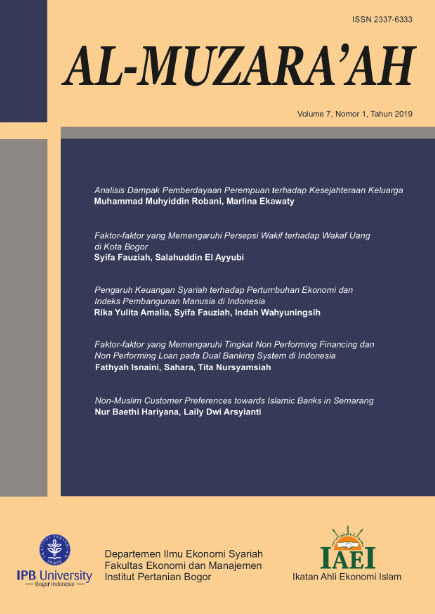Pengaruh Keuangan Syariah terhadap Pertumbuhan Ekonomi dan Indeks Pembangunan Manusia di Indonesia
Main Article Content
Abstract
One of variable to calculate the Human Development Index (HDI) is a decent standard of living derived from the Gross Domestic Product (GDP) figure. Therefore, the increase in HDI could be influenced by GDP. Furthermore, as a Muslim-majority country and adopting a dual banking system, Indonesia's GDP is certainly also influenced by the Islāmic financial sector, such as zakat and Islāmic bank financing. In this case, zakat plays role as a wealth distribution instrument. Then Islamic bank financing could be a funding capital for the community and the country. So, this study analyzes the direct and indirect relationship between the variables of zakat, Islamic bank financing and GDP to the HDI. The method used is path analysis which aims to look at the hypothesis of causal relationships. The results obtained are the direct relationship of Islamic bank financing and GDP significantly positive effect on HDI. Zakat and Islamic bank financing variables have a positive effect on GDP. The greatest coefficient value between direct relationships is the coefficient of Islamic bank financing on GDP, which is equal to 81.7%. But the direct relationship of zakat to the HDI cannot be known. While the indirect relationship shows that there is an influence between the variables of zakat on the HDI through GDP and there is an influence between the variables of Islamic bank financing on the HDI through GDP.
Downloads
Article Details

This work is licensed under a Creative Commons Attribution-ShareAlike 4.0 International License.
Author(s) who published in this journal agree to following terms:
- Authors understand and agree that copyright of manuscripts published are held by Al-Muzara'ah. The statement to release the copyright to Al-Muzara'ah is stated in form CTA (link doc).
- Copyright encompass exclusive rights to reproduce, to distribute, and to sell any part of the journal articles in all form and media.
This work is licensed under a Creative Commons Attribution-ShareAlike 4.0 International License (CC BY-SA) where Authors and Readers can copy and redistribute the material in any medium or format, as well as remix, transform, and build upon the material for any purpose, but they must give appropriate credit (cite to the article or content), provide a link to the license, and indicate if changes were made. If you remix, transform, or build upon the material, you must distribute your contributions under the same license as the original.
References
Baeti, N. (2013). Pengaruh pengangguran, pertumbuhan ekonomi, dan pengeluaran pemerintah terhadap pembangunan manusia kabupaten/kota di Provinsi Jawa Tengah tahun 2007-2011. Economics Development Analysis Journal, 2(3), 85-98.
Dewi, N. (2017). Pengaruh kemiskinan dan pertumbuhan ekonomi terhadap Indeks Pembangunan Manusia di Provinsi Riau. Jurnal Online Mahasiswa, 4(1), 870-882.
Ayyubi, S. E., Anggraeni, L., & Mahiswari,A. D.. (2017). Pengaruh bank syariah terhadap pertumbuhan ekonomi di Indonesia. AL-MUZARA'AH, 5(2), 88-106.
Farahani, Y. G. & Dastan, M. (2013). Analysis of Islamic banks’ financing and economic growth: A panel cointegration approach. International Journal of Islamic and Middle Eastern Finance and Management, 6(2), 156-172. https://doi.org/10.1108/17538391311329842.
Firdaus, M., Beik, I. S., Irawan, T., & Juanda, B. (2012). Economic Estimation and Determinations of Zakat Potential in Indonesia. IRTI Working Paper Series WP#1433-07.
Furqani, H., & Mulyany, R. (2009). Islamic banking and economic growth: Empirical evidence from Malaysia. Journal of Economic Cooperation and Development, 30(2), 59-74.
Hachicha, N. & Amar, A. B. (2015). Does Islamic bank financing contribute to economic growth? The Malaysian case. International Journal of Islamic and Middle Eastern Finance and Management, 8(3), 349-368. https://doi.org/10.1108/IMEFM-07-2014-0063
Iqbal, M. M. (2019). Inclusive growth with zakat. The Pakistan Development Review, 54(4), 997-1010.
Majid, M. S. A. & Kassim, S. (2015). Assessing the contribution of Islamic finance to economic growth: Empirical evidence from Malaysia. Journal of Islamic Accounting and Business Research, 6(2), 292-310. https://doi.org/10.1108/JIABR-07-2012-0050
Maulana, R. & Bowo, P. A. (2013). Pengaruh Pertumbuhan Ekonomi, Pendidikan dan Teknologi terhadap IPM Provinsi di Indonesia 2007-2011. JEJAK: Jurnal Ekonomi dan Kebijakan, 6(2).
Murni, A. (2006). Ekonomika Makro. Bandung, PT. Refika Aditama.
Murniati, R., & Beik, I. S. (2014). Pengaruh zakat terhadap Indeks Pembangunan Manusia dan tingkat kemiskinan mustahik : Studi kasus pendayagunaan BAZNAS Kota Bogor. AL-MUZARA’AH, 2(2), 135–149.
Nurzaman, M. S. (2010). Zakat and human development: An empirical analysis on poverty alleviation in Jakarta , Indonesia. 8th International Conference on Islamic Economics and Fnance, 1–26. Qatar: Center for Islamic Economics and Finance, Qatar Faculty of Islamic Studies, Qatar Foundation.
Ranis, G., Stewart, F., & Ramirez, A. (2000). Economic growth and human development. World Development, 28(2), 197-219.
Sharma, R. K. & Kaur, L. (2015). Relationships between economic growth and human development: An empirical study with Special Reference to Haryana. IPE Journal of Management, 5(1).
Simanjuntak, R. (2018). Pengaruh kinerja pembiayaan mikro musyarakah dan mudharabah di bank syariah terhadap sektor usaha mikro di Provinsi Jawa Timur. Indonesian Journal of Islamic Economics and Finance, 1(1), 32–53.
Sugiyono. (2010). Metode Penelitian Kuantitatif Kualitatif dan R&D. Bandung, Alfabeta.
Tambunan (2016). Analisis Pengaruh Investasi, Operasi Moneter, dan ZIS terhadap Pertumbuhan Ekonomi Indonesia. (Tesis, Universitas Islam Negeri Sumatera Utara).
Terminanto, A. A. & Rama, A. (2017). Pengaruh belanja pemerintah dan pembiayaan bank syariah terhadap pertumbuhan ekonomi: Studi kasus data panel provinsi di Indonesia. Iqtishadia: Jurnal Kajian Ekonomi dan Bisnis Islam, 10(1), 97-129.

